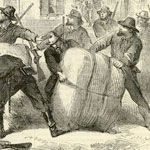McMinn Historical Society
Cannot find any information about historical site affiliation or society offerings.
Cannot find any information about historical site affiliation or society offerings.
The Society operates the Gordon Browning Museum, a publicly-supported museum and repository for documents, images, and artifacts that represent the history and culture of Carroll County, Tennessee. The museum is named in honor of the two-time Governor of the State of Tennessee Gordon Browning and contains numerous papers, photographs, and personal effects of the former governor.
The museum offers exhibits and research library access.
Site provides very few specifics about the offerings of the museum.
Cannot find a website.
The Hotel Halbrook Railroad & Local History Museum will be restored to reflect life in the early 20th century, a story of the defining era for the Dickson community. The 1912 building is one of the few remaining examples of a rural Tennessee railroad hotel.
Not yet open to the public; check for duplicates in unpublished entries.
The website offers no information on the museum aside from basic contact information. It does not appear to have been updated since 2006.
John Sevier (1745-1815), early pioneer, Indian fighter, governor of the failed State of Franklin, and first governor of Tennessee, built a plantation home, which he called Marble Springs, when he came to the state capital, Knoxville, in 1796. The site had been a way station for travelers along the road to Knoxville. He and his wife, Bonny Kate, lived at Marble Springs until his death. The only original building, the two-story main cabin, has been restored and furnished with Sevier family items and other frontier pieces. Additions include a kitchen, a loom house, a smokehouse, a spring house, and a barn. The Walker Cabin, circa 1830, has been moved to the site and features artifacts and a video presentation.
A second website for the site can be found here.
The site offers a short film, tours, workshops, educational programs, and occasional recreational and educational events (including living history events).
No details available.
In this workshop, teachers will get a chance to tour the Stones River National Battlefield and discuss ways to use the park's resources to help students master curriculum standards in multiple disciplines.
No details available.

Tennessee teachers, looking for a state-specific overview of U.S. history? Three years in the making, this project of the Tennessee State Museum outlines Tennessee state history from pre-history to the present day. Each of nine chronological sections—"First Tennesseans," "Indians & Cultural Encounters," "Frontier," "Age of Jackson," "Civil War & Reconstruction," "Confronting the Modern Era," "Depression & WWII," "Civil Rights/Cold War," and "Information Revolution"—begins with an introductory essay on the time period. Two to three subsections per time period offer essays on daily life and work, military and political history, civil rights issues, and other topics; users can click down from each subsection to further
essays on even more specific topics.
Links within the essays lead to extracts from primary sources (such as the journal of early explorer Casper Mansker or a recipe for soap), answers to "Dig Deeper" historical questions, interactive activities (including a Chart of Traditional Cherokee Kinships), and related articles and sources on other websites. A slideshow of enlargeable images of primary sources (artifacts and documents) accompanies most essays, and several essays include embedded audio clips.
Each time period includes a "Teacher's Page" (linked from the bottom of the section's top essay), with lessons and extension activities. Thirty-seven lessons and three extension activities are currently live on the site; broken links may be repaired in future.
"Site Search," in the left-hand sidebar by each essay, allows full searching of the site's content.